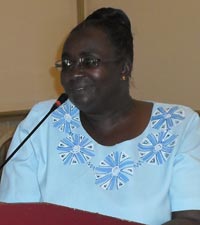Nurses gear up to support mothers to increase national breastfeeding rates
THE Ministry of Health yesterday declared open its annual ‘Baby- Friendly Breast Feeding’ workshop, targeting members of the National Breastfeeding Committee and representatives of Regional Breastfeeding Committees countrywide.

The workshop being held at the Regency Suites will end today, wrapping-up two days of deliberations on how nurses can support mothers in the concerted national bid to increase breastfeeding rates exponentially. This year’s World Breastfeeding Week theme, ‘Breastfeeding Support: Close to Mothers’ is being replicated for the workshop.
For the first time in the 20-year history of the initiative locally, all ten administrative regions are being represented at the meeting. Previously, the remote Regions 1, 8, and 9, were not included, but this year, all regions from one to ten have representation at the meeting.
Co-ordinator of the National Breastfeeding Committee, Ms. Ninian Blair, said that 19 of the nation’s hospitals are involved in the baby-friendly initiative. Three have already been conferred ‘Baby-Friendly’ status, while the other 16 that are currently working towards this end were subjected to national assessment which was concluded last September. However, the three designated ‘Baby-Friendly Hospitals’ are now working towards re-assessment. The final report is being prepared at the moment, Blair said.
Blair also noted that based on preliminary findings at the national level, more work needs to be done in relation to Step 10 (in the Baby-Friendly Hospital criteria). That step deals with support for women following delivery of their babies. However, she admitted, “That has been found to be one of our weak areas; hence this workshop is targeting support for women.”
Further, she said, research has shown that mothers who have breastfeeding support within the first seven days of delivery are more successful at exclusive breastfeeding, and threw out a challenge to the nurses. “Can we as healthcare workers reach all of our mothers within the first seven days of birth?” The workshop sought to examine how, and the community support group was one idea mooted.
COMMUNITY SUPPORT GROUPS
“We have to robustly pursue the formation of community support groups. So through this workshop, we are aiming to help the same health team that we have here. And that team comprises of the national Regional Hospital Committees. We will help them to form their support groups by giving them the strategies and the methods that we can use, to help them to become baby- friendly. We need to make their support more functional and working, so we can refer our mothers to them, “the co-ordinator proposed.
Explaining the ‘baby-friendly’ concept, Blair stated: “The initiative seeks to help mothers to have a safe delivery, and to ensure our babies are breast-fed within the first hour of birth. It also entails training for staff, training at the healthcare level, protecting our mothers from the formula companies in keeping with the International Code of Marketing of breast milk substitutes.” She said that while the Ministry of Health /National Breastfeeding Committee is not preventing persons from selling the breast milk substitutes, the real challenge faced, is the marketing which can negatively impact the success of the breastfeeding initiative.
In the supporting documents received from the World Alliance for Breastfeeding Action (WABA), it was stated that even when mothers are able to get off to a good start, all too often, in the weeks or months after delivery, there is a sharp decline in breastfeeding rates and practices, particularly exclusive breastfeeding.
The critical period when mothers do not visit a healthcare facility is the time when a community support system for mothers becomes crucial. She said that continued support to sustain breastfeeding can be provided in a variety of ways.
DAY-TO-DAY SUPPORT
To this end she pointed to the traditional support provided by the family, but was concerned that as societies change, support for mothers from a wider circle is needed. “Whether it is provided by trained health workers, lactation consultants, community leaders, or from friends who are also mothers and/or from fathers/partners, support is needed,” she contended.
Meanwhile, the Peer Counselling Programme, Blair advised, is a cost effective and highly productive way to reach a larger number of mothers more frequently. Peer counsellors can be anyone from the community who is trained to learn to support mothers. They become the lifeline for mothers with breastfeeding questions and issues, she said.
Blair ended on the note that: “The key to best breastfeeding practices is continued day-to-day support for the breastfeeding mother within her home and community.”
(By Shirley Thomas)



.jpg)








